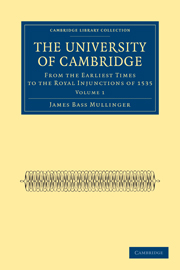Book contents
- Frontmatter
- PREFACE
- Contents
- CHAP. I FROM THE ROYAL INJUNCTIONS OF 1535 TO THE FOUNDATION OF TRINITY COLLEGE
- CHAP. II FROM THE FOUNDATION OF TRINITY COLLEGE TO THE ACCESSION OF ELIZABETH
- CHAP. III FROM THE ACCESSION OF ELIZABETH TO THE DEATH OF ARCHBISHOP PARKER
- CHAP. IV FROM THE DEATH OF ARCHBISHOP PARKER TO THAT OF LORD BURGHLEY
- CHAP. V COLLEGE LIFE
- CHAP. VI FROM THE DEATH OF LORD BURGHLEY TO THE ACCESSION OF CHARLES I
- APPENDIX
- INDEX
CHAP. III - FROM THE ACCESSION OF ELIZABETH TO THE DEATH OF ARCHBISHOP PARKER
Published online by Cambridge University Press: 05 November 2011
- Frontmatter
- PREFACE
- Contents
- CHAP. I FROM THE ROYAL INJUNCTIONS OF 1535 TO THE FOUNDATION OF TRINITY COLLEGE
- CHAP. II FROM THE FOUNDATION OF TRINITY COLLEGE TO THE ACCESSION OF ELIZABETH
- CHAP. III FROM THE ACCESSION OF ELIZABETH TO THE DEATH OF ARCHBISHOP PARKER
- CHAP. IV FROM THE DEATH OF ARCHBISHOP PARKER TO THAT OF LORD BURGHLEY
- CHAP. V COLLEGE LIFE
- CHAP. VI FROM THE DEATH OF LORD BURGHLEY TO THE ACCESSION OF CHARLES I
- APPENDIX
- INDEX
Summary
Oxford more favoured than Cambridge during the reign of Mary
The ablest apologists of the Catholic cause have scarcely been able to deny that the influences which prevailed at the two Universities during the reign of Mary were reactionary with respect to learning; but they have dwelt with emphasis on the royal regard for the material interest of the two communities and the scrupulous sense of justice which enforced the restitution of the alienated revenues of the Church. Oxford, which undoubtedly enjoyed the larger share of Mary's favour, saw her public schools entirely rebuilt. Some valuable impropriations were also bestowed on the university, and the revenues of Christ Church received a substantial increase. To the influence of the example thus set by the Crown, we may also refer the rise of the two colleges of Trinity and St John the Baptist—acts of beneficence which shine with additional lustre amid the surrounding gloom, and but for which, Heylin does not hesitate to declare ‘there had been nothing in this reign to have made it memorable, but only the misfortunes and calamities of it.’ When compared, as regards their conception and constitution, with Trinity College, Cambridge, these two societies present however an almost humiliating contrast. St John's, founded by Sir Thomas White, a benevolent but somewhat weak and superstitious citizen of London, was left subject to a certain extent to Christ Church and narrowly escaped the fate of becoming a mere appanage to that society. The modest foundation of Trinity, with its twelve fellows and twelve scholars, owed its origin to Sir Thomas Pope, and presents a certain resemblance to Magdalene College at the sister university.
- Type
- Chapter
- Information
- The University of Cambridge , pp. 166 - 249Publisher: Cambridge University PressPrint publication year: 2009First published in: 1873

